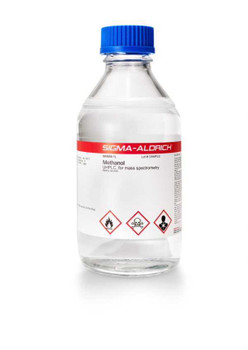Description
Hexane, HPLC Plus, for HPLC, GC, and residue analysis, ≥95%, 4 x 4L
Synonym(s):
n-Hexane
Linear Formula:
CH3(CH2)4CH3
CAS Number:
110-54-3
Molecular Weight:
86.18
Beilstein:
1730733
EC Number:
203-777-6
MDL number:
MFCD00009520
PubChem Substance ID:
57652091
grade
HPLC Plus
for residue analysis
Quality Level
100
vapor density
~3 (vs air)
vapor pressure
256 mmHg ( 37.7 °C)
5.2 psi ( 37.7 °C)
~132 mmHg ( 20 °C)
assay
≥95%
form
liquid
autoignition temp.
453 °F
expl. lim.
7.7 %
technique(s)
HPLC: suitable
gas chromatography (GC): suitable
impurities
≤0.01% water
water
refractive index
n20/D 1.375 (lit.)
bp
69 °C (lit.)
mp
−95 °C (lit.)
solubility
ethanol: soluble(lit.)
density
0.659 g/mL at 25 °C (lit.)
SMILES string
CCCCCC
InChI
1S/C6H14/c1-3-5-6-4-2/h3-6H2,1-2H3
InChI key
VLKZOEOYAKHREP-UHFFFAOYSA-N
Hexane (n-hexane) is a volatile organic compound. It can be obtained from petroleum by distillation or by electrolyzing potassium butyrate solution. It is a widely employed organic solvent for the dissolution and isolation of fats and oils. Its thermodynamic properties and kinetics of thermal decomposition have been studied over a range of temperature. A study on the zeolite supported platinum catalyzed isomerization and aromatization of n-hexane has been reported. Its removal from hexane contaminated air streams using vapor phase biological reactor (VPBR) immobilized with hexane-degrading Aspergillus niger strain has been studied. The metabolism of n-hexane forms 2,5-hexanedione (2,5-HD), which is reported to induce neurotoxicity.
Application
Hexane may be used in the following processes:
- Synthesis of graft-copolymer chains of poly-(dimethylsiloxane)-g-poly(methyl methacrylate).
- Gas chromatography/mass spectrometry (GC/MS) characterization of essential oils isolated from various origins.
- To extract free and total gossypol in combination with acetone from cottonseed flakes.
Packaging
4, 4×4 L in PVC-coated bottle
Recommended products
Discover LiChropur reagents ideal for HPLC or LC-MS analysis
Signal Word
Danger
Hazard Statements
H225 - H304 - H315 - H336 - H361f - H373 - H411
Precautionary Statements
P202 - P210 - P273 - P301 + P310 - P303 + P361 + P353 - P331
Hazard Classifications
Aquatic Chronic 2 - Asp. Tox. 1 - Flam. Liq. 2 - Repr. 2 - Skin Irrit. 2 - STOT RE 2 Inhalation - STOT SE 3
Target Organs
Central nervous system, Nervous system
Storage Class Code
3 - Flammable liquids
WGK
WGK 2
Flash Point(F)
-7.6 °F
Flash Point(C)
-22 °C
Personal Protective Equipment
dust mask type N95 (US), Eyeshields, Gloves





